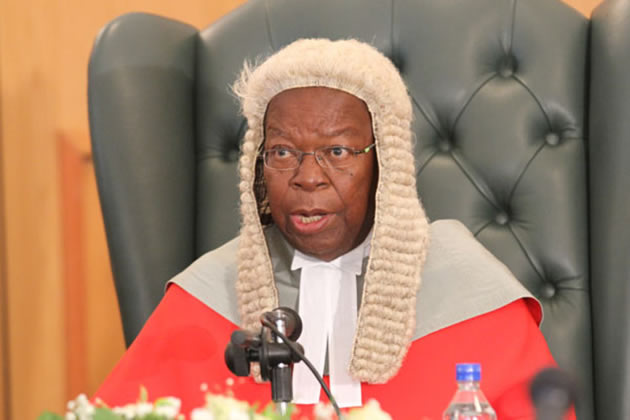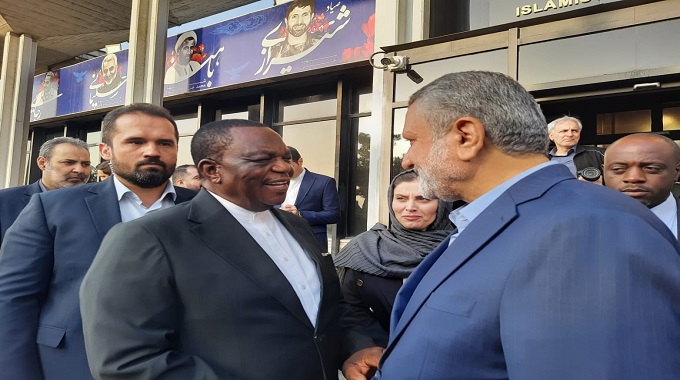Labour row appeal ‘urgent’

Daniel Nemukuyu Senior Court Reporter
Two Zuva Petroleum managers, Mr Don Nyamande and Mr Kingstone Donga, who are contesting the Supreme Court judgment allowing employers to terminate workers’ contract on notice, have filed a chamber application for their constitutional appeal to be heard on an urgent basis. Chief Justice Godfrey Chidyausiku and four others, sitting as the Supreme Court’s full bench, recently dismissed an appeal by Mr Nyamande and Mr Donga on the basis that the common law rule that places the employer and the employee on an equal footing was still valid.
The court held that Section 12B of the Labour Act did not abolish the common law position hence the employer was entitled to terminate employment on notice the same way workers do whenever they leave employment.
That prompted the duo to file an appeal at the Constitutional Court.
While the appeal was pending, the pair also approached the Constitutional Court with an urgent chamber application to have their main challenge heard on an urgent basis.
In the urgent application filed on Friday by Matsikidze and Mucheche law firm, the pair urged the court to treat the matter with urgency considering that thousands of workers had been fired in a week on the basis of the contested judgment.
The applicants’ lawyers urged the Constitutional Court to be mindful of the crisis that had hit the industry in Zimbabwe in a week.
“The matter is extremely urgent as demonstrated by the fact that since the passing of the aforesaid judgment which is the subject of the appeal under CCZ60/15 on the 17th of July 2015, several employees had their contracts of employment indiscriminately terminated on notice on the basis of the same judgment as reported by The Herald newspaper editions of July 20, 21, 22 and 23 2015.
“I urge this Honourable Court to take judicial notice of this development,” reads certificate of urgency forming part of the urgent application.
The lawyers said it was critical for the court to quickly determine the matter.
“It is fundamentally critical for the Honourable Court to dispose of the applicants’ appeal on an urgent basis so that there is a final judgment on this matter.
“This matter cannot wait. Applicants are justified in approaching this court on an urgent basis,” reads the certificate of urgency.
In the main constitutional appeal, Mr Nyamande and Mr Donga are now challenging the constitutionality of the law relied upon by the Supreme Court in throwing out their appeal.
The two’s lawyers argued that the Supreme Court erroneously ruled without seeing copies of contracts of employment between the two managers.
“The Supreme Court erred in law in such a fundamental respect as to deny the appellants the benefits of law granted to them by Section 56 of the Constitution, particularly in that:
“It (Supreme Court) erred by upholding the Labour Court judgment on the basis that the appellants’ contracts of employment provided the respondent as employer with a common law right to terminate their contracts of employment when such contracts were conspicuously not available in the Labour Court and consequently not in the Supreme Court record despite the fact that before the arbitrator, appellants placed respondent on the strictest proof to prove the bare and unsubstantiated allegation that their contracts purportedly entrenched termination on notice by the employer but the employer failed to do so.”
The lawyers argued that the court ought to have considered the fact that the underlying cause of the termination of the appellants’ contracts of employment in respect of the two managers was retrenchment and Zuva Petroleum had to abandon the retrenchment route it had already in- itiated.
It was argued that the court could have found that termination on notice violated the purpose of Section 2A of the Labour Act as read together with the provisions of International Labour Organisation Convention 158 which stipulates that termination should only be done when there is a valid cause.
The lawyers further argued that the Supreme Court violated Section 3 of the Constitution.
“The Supreme Court erred in law and infringed Section 3 of the Constitution in reviving a common law rule that last had application more than 30 years ago without first developing the common law under Section 176 of the Constitution of Zimbabwe, 2013,” reads the grounds of appeal.
The Supreme Court, the lawyers argued, erred by not applying Section 5 Statutory Instrument 15 of 2006 that prohibits termination on notice because it infringes Section 56 of the Constitution.
It was argued in the papers that the court applied a non-existent rule of the common law, thereby infringing the duo’s rights enshrined under Section 56 and 65 of the Constitution of Zimbabwe.
The court, the lawyers argued, erred when it concluded that Section 12B of the Labour Act does not prohibit termination of employment on notice.
The pair wants the Constitutional Court to quash the judgment of the Supreme Court and to declare it unconstitu- tional.









Comments